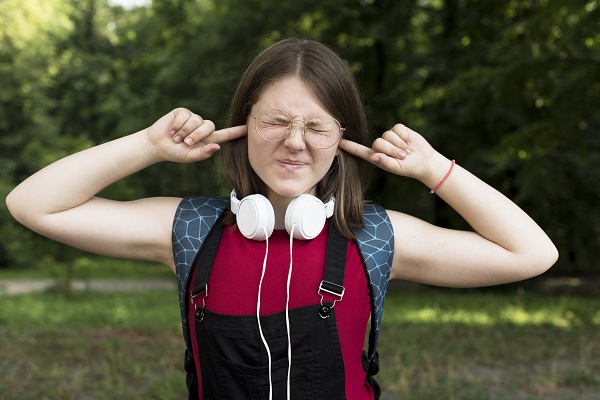 Loud Music and Health: What You Need to Know
Loud Music and Health: What You Need to Know

Do you crank up the volume when you're out and about? You're not alone. But do you know what dangers come with it?
Studies have shown that listening to loud music can cause long-term damage to your hearing, as well as other serious health risks.
So, before you hit the volume button, let's take a closer look at the link between loud music and health, and discover what you need to know to protect your ears.
Key Takeaways
-
Listening to loud music at high volumes can cause long-term damage to your hearing.
-
Exposure to noise can lead to various health problems, including elevated blood pressure, increased risk for heart attacks and strokes, and aggressive behavior.
-
Following the 60/60 rule (keeping volume at 60% and limiting earphone use to 60 minutes at a time) can help reduce the risks of hearing loss.
-
A good diet, rich in antioxidants, can improve blood supply to the inner ear and prevent hearing problems.
Dangers of Loud Music
You need to be aware of the dangers of listening to loud music.
85% of people surveyed play their MP3 players at more than 50% volume, blasting 104 decibels into their ears.
Exposure to noise above 90 decibels can lead to hearing problems, tinnitus, elevated blood pressure, and even increased risk for heart attacks and strokes.
Not to mention the effects of loud music on mental health and its impact on sleep quality.
To reduce the risk of hearing loss, follow the 60/60 rule: keep volume at 60% and limit earphone use to 60 minutes at a time.
Choose good quality earphones like the earHero earphone to protect ear health while enjoying music.
Tips to Reduce Risks
To reduce the risks of hearing loss, it's important to follow certain guidelines. Regular exercise has been linked to improved circulation and better ear health.
Furthermore, regular hearing check-ups can help identify and address any hearing problems before they worsen. It's important to follow the 60/60 rule: keep the volume at 60% and limit earphone use to 60 minutes at a time. Additionally, give your ears a 10-minute break for every hour of earphone use.
Eating a healthy diet with plenty of antioxidants can help improve blood supply to the inner ear. Quitting smoking can reduce the negative effect on blood supply to the inner ear and help prevent hearing problems.
Good Diet for Ear Health
Frequently eating a healthy diet with plenty of antioxidants can help improve blood supply to the inner ear and support ear health. The benefits of exercise and impact of stress on hearing also play a role in maintaining ear health.
Eating well can help reduce the risk of hearing problems, while proper nutrition can prevent long-term damage to your hearing. Antioxidant-rich foods, such as fruits and vegetables, promote better ear health and can even reverse some hearing damage.
Smoking has a negative effect on blood supply to the inner ear, so it's important to quit in order to reduce the risk of hearing loss.
Lastly, choosing good quality earphones like the earHero earphone can also reduce the risk of hearing loss. Taking these steps can help preserve your hearing and keep you safe from the dangers of loud music.
Quitting Smoking Benefits
Have you ever wondered what quitting smoking can do for your hearing health?
Quitting smoking significantly reduces the risk of hearing problems and can improve blood supply to the inner ear. This can help protect your hearing against long-term damage.
Additionally, the benefits of exercise and avoiding stress can further promote better ear health. Studies have shown that regular exercise boosts blood flow to the inner ear, and reducing stress can prevent hearing problems caused by high cortisol levels.
High-Quality Earphones
Furthermore, investing in high-quality earphones is an important step to protect your hearing health. Noise-canceling technology helps to reduce the sound pressure entering the ear, which is especially important when listening to loud music.
To make sure you're getting the best earphones, look for comfortable and ergonomic designs that fit into the ear without fully blocking it. This type of earphone is designed to reduce the risk of hearing loss while still allowing you to enjoy your music.
The earHero earphone is one such example, as it has been specifically designed to protect your ear health. With its noise-canceling technology and comfortable design, it's a great choice for listening to music.
Investing in a high-quality earphone is an easy and effective way to protect your hearing health.
Preventing Hearing Loss
In addition to investing in high-quality earphones, there are other steps you can take to prevent hearing loss from loud music.
Follow the 60/60 rule: keep the volume at 60% and limit earphone use to 60 minutes at a time. Give your ears a 10-minute break for every hour of earphone use.
Wear ear protection when attending concerts or other loud events.
Eating a healthy diet rich in antioxidants and avoiding smoking can benefit blood supply to your inner ear.
Finally, noise-induced hearing loss is a real risk, so avoid exposing yourself to sounds louder than 90 decibels.
Taking these precautions can help protect your hearing and keep your ears healthy for years to come.
Conclusion
It's important to be aware of the potential risks of listening to loud music. Taking the necessary precautions to keep your ears safe can help reduce the risk of hearing loss.
Eating a balanced diet, quitting smoking, and investing in high-quality earphones are all ways to protect your hearing.
By being mindful of the dangers of loud music and taking the necessary steps to prevent hearing loss, you can enjoy your favorite tunes without putting your hearing at risk.